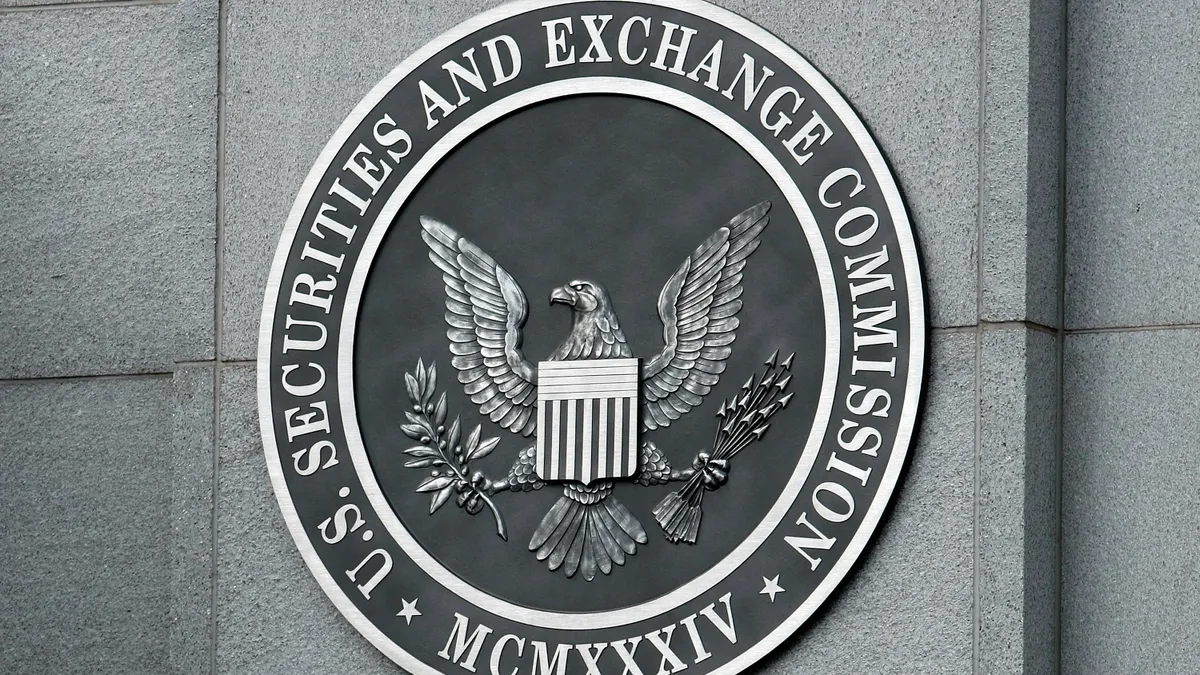Dive Brief:
- Two Wells Fargo-affiliated investment advisers and Merrill Lynch agreed to pay $60 million to settle charges with the Securities and Exchange Commission over what the regulator on Friday called a failure to implement written policies and programs related to their cash sweep programs.
- The SEC, on the same day, issued an $18 million penalty against broker-dealer and investment adviser LPL Financial over alleged anti-money laundering compliance failures.
- The firms neither admitted nor denied the charges.
Dive Insight:
Wells Fargo Advisors Financial Network, Wells Fargo Clearing Services and Bank of America’s Merrill Lynch violated the Advisers Act overlooked client interests by exclusively offering low-yield bank deposit sweep programs while pocketing significant profits, the SEC said in Friday’s order.
The firms set the interest rates in their sweep programs, and when rates rose, the yield differential between the programs and other cash sweep alternatives increased by almost 4%, the agency said.
Both firms failed to implement proper policies for selecting sweep options in clients' best interests and guiding advisors on cash management, the SEC said
“Cash sweep programs impact nearly all advisory clients, who often pay advisory fees on assets held in these accounts,” Sanjay Wadhwa, acting director of the SEC’s division of enforcement, said Friday, his last day in office. “These actions reinforce that advisory firms must have reasonably designed policies and procedures to consider their clients’ best interest when evaluating potential sweep options for cash held in advisory accounts and to ensure that cash held in an advisory account is properly managed by financial advisers consistent with a client’s investment profile.”
Wells Fargo and Morgan Stanley each warned investors in August of SEC probes related to their cash sweep programs.
Wells Fargo agreed to pay $35 million in penalties: $28 million from Clearing Services and $7 million from the advisors financial network unit.
“Our agreement with the SEC puts this broader industry matter behind us, and as the settlement states, we have already successfully addressed the issues covered by the resolution,” a Wells Fargo spokesperson told Banking Dive via email on Tuesday.
Investors sued Wells Fargo in September for allegedly underpaying interest to clients in its cash sweep program. They accused the lender of breach of fiduciary duty, fair dealing, breach of contract and unjust enrichment.
Merrill Lynch, meanwhile, agreed to pay $25 million to settle the charges against it, pointing to a section of the SEC order that said the firm promptly pursued remedial action and cooperated with agency staff to expedite the process.
“As the SEC noted, Merrill took several significant steps before becoming aware of the Commission’s investigation, including increasing the rates paid to advisory clients in Merrill’s Bank Deposit Program, lowering the minimum thresholds for investing cash in certain money market funds, and adopting and implementing enhanced supervisory procedures,” a Merrill Lynch spokesperson told Banking Dive by email. “In fact, Merrill was one of the first large firms to offer a significantly higher cash sweep rate for advisory clients’ uninvested cash.”
LPL also was among financial firms that warned investors in August of potential cash sweep issues.
But the SEC’s penalty against the company found it violated AML compliance guidelines from at least May 2019 to December 2023 by not properly verifying customer identities and failing to close accounts that did not require proper verification. The firm also allowed prohibited high-risk accounts, including cannabis-related and foreign accounts, to operate against its own policies, the SEC said.
“Federal law requires broker-dealers to ascertain the identity of their customers and to conduct ongoing customer due diligence to aid the government in its efforts to detect and prevent money laundering,” Stacy Bogert, associate director of the SEC’s division of enforcement, said in a statement Friday.
“When broker-dealers like LPL fail to comply with their AML obligations, they put the securities markets at risk,” she said, adding that the SEC’s fine underscores the importance of abiding by the rules related to customer identification and due diligence.
The firm agreed to continued oversight by a compliance consultant to improve its AML procedures.
“The settlement relates to recordkeeping and retention issues,” an LPL spokesperson told Banking Dive in an email. “We cooperated with the SEC’s investigation and have taken proactive steps to enhance AML policies and procedures. We take our regulatory obligations seriously and are pleased to resolve this matter.”
The penalty marks the latest woe for LPL, which fired its CEO in October after an external investigation found he violated the company’s code of conduct with statements he made to employees.
The SEC penalties came ahead of the Trump administration taking office Monday. Many analysts have predicted regulatory scrutiny will ease for financial firms.













